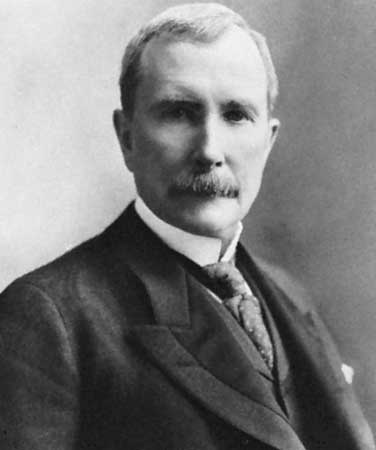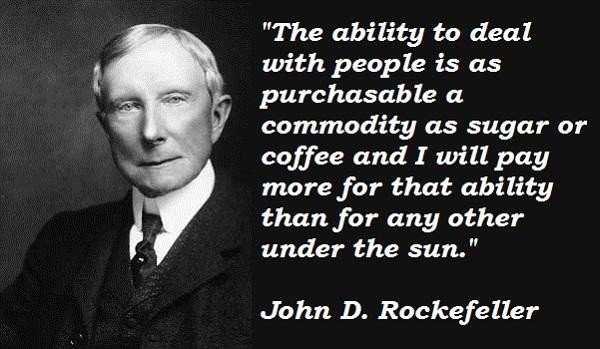7 Hard Truths About Success From John D. Rockefeller
By Bruce Harpham
January 14, 2015 • Fact checked by Dumb Little Man

We love to celebrate the success of technology entrepreneurs such as Bill Gates and Steve Jobs. Their technologies and companies have shaped our era. Every single day, I use Apple and Microsoft products for productivity and leisure. Their impact of these entrepreneurs has rightly caused many to seek success lessons from them.

Many writers and authors have analyzed these and other technology companies for success lessons. For example, an Amazon book search for Steve Jobs, the legendary Apple CEO, reveals over 14,000 titles. At a certain point, we just go numb to studying the same people. Perhaps you feel that way about Jobs and other leaders from the technology industry.
Fortunately, history is filled with many examples that provide plenty of inspiration and instruction. Right here on Dumb Little Man, Tom Meitner wrote about what we can learn from former U.S. President Theodore Roosevelt. Who else can we learn from in the past? After all, some people struggle to relate to political leaders.
Let’s consider John D. Rockefeller (1839-1937), founder of Standard Oil and one of America’s most famous businessmen and philanthropists. Last year, I read “Titan: The Life of John D. Rockefeller, Sr” by Ron Chernow based on Ryan Holiday’s excellent article “25 Recommendations For Life Changing Biographies For The Voracious Reader In You”.
Based on my study of Rockefeller, here are seven hard truths about Rockefeller for us to consider as we pursue success.
1-Expect Criticism When You Achieve Success
Rockefeller and his partners created one of the largest companies in American history. Near the end of the 19th century, Standard Oil controlled the majority of America’s oil industry and exerted significant control over the railroads. For years, his critics harshly criticized his methods and attacked his character. While some of the criticism was justified, much of it was exaggerated.
Whether you are simply saying no to other pursuits or making difficult decisions, expect criticism on your journey.
2-Expect To Toil In Obscurity For A Time
Did you know that Rockefeller started his career as a clerk? As a teenager, Rockefeller worked at a small firm called Hewitt and Tuttle firm in Cleveland. He worked steadily in that role for several years, methodically examining every bill for accuracy, collecting payments from customers and otherwise helping the firm grow. During this time, Rockefeller established one of the disciplines that enabled his later success – a deep appreciation for profit and loss in business.
If you’re working in obscurity right now, look for ways to make the most of it. That’s a challenging truth to implement. Yet, Rockefeller’s example shows the way.
3-Celebrate Your Achievements (“Job Day”)
Did you know that highly ambitious and achievement oriented people often struggle to celebrate their successes? If you are driven to achieve success, taking time to celebrate may seem irrelevant. What does Rockefeller have to teach us in this case?
Rockefeller celebrated “Job Day” – September 26, 1855 – when he landed his first job – as the beginning of his long road to financial independence. Celebrating a milestone – such as the publication date of your first book or your first job – provides encouragement and encourages you to reflect on what you’ve achieved. The New York Times has shown that gratitude improves your happiness so why not celebrate your achievements with gratitude?
4-Manage Assets Responsibly, Decade After Decade
Rockefeller was legendary for his restrained spending. In an era when the wealthy purchases yachts, private railroad cars and expensive clothing, Rockefeller avoided such consumption. In our era, that approach is called playing financial defense and it is a key part of achieving success. However, you also need to manage your assets.
Rockefeller was the ultimate buy and hold investor. For decades, he never sold stock in Standard Oil. Instead, he watched his wealth increase over time. In contrast, his brother William had less concern for long term assets. Rockefeller biographer Ron Chernow points out the difference in this memorable passage from “Titan”:
“Since William refused to take on debt to build his house, he sold $50,000 of Standard oil stock to John despite his brother’s heartfelt plea to retain the stock. William’s imprudent decision figured importantly in the enormous disparity in wealth that developed between the two brothers.”
5-Learn The Art of the Deal
A well planned and executed deal can catapult you forward. Again and again, Rockefeller successfully negotiated deals with rival companies, partners and railroads to expand Standard Oil across America.
In fact, some of Standard Oil’s most loyal managers and executives originally came from competitors. Whether you are negotiating to buy a house or increase your freelance earnings, the confidence and skill to make excellent deals is an essential success skill.
In later years, some of Rockefeller’s deals were criticized for being unfair. In my view, that is another excellent reason to learn the art of the deal – to prevent yourself from taking the wrong deal.
6-You Can’t Know It All – Leverage Expert Help
I love to learn and become develop skills. If you’re reading this article, you probably also has a thirst for knowledge. However, the world is very complex so it is essential to learn how to leverage the power of experts.
When Rockefeller built Standard Oil, he had outstanding strengths in management, organization and negotiation. By and large, he left research and development of oil and related products to experts. Later in his life, Rockefeller brought in assistants and advisers to help him plan his philanthropic efforts.
As we pursue success, it is vital that we seek out the power of experts. By all means, start by working on a problem yourself so that you can learn the right questions. Eventually, seeking expert help is a success strategy that can accelerate your progress dramatically.
7-Understand The Limits of Money
By the early 1900s, Rockefeller was subjected to numerous lawsuits, investigations and negative media coverage. The constant negative pressure meant he avoided the public heavily and missed out on important events, such as visiting some of his grandchildren. Even more frustrating, his charitable donations were under suspicion and often criticized. His great wealth did not eliminate these problems.
Money, like political power or fame, can bring wonderful benefits. Overall, Rockefeller was successful in managing his wealth. For example, his donations were essential to establishing the University of Chicago and the Rockefeller University, a leading research institution in New York City. By many measures, he made a positive impact on the world through his giving.
Now, it’s your turn: What aspect of Rockefeller’s life and achievements inspire you to take action?
Bruce Harpham
Bruce Harpham is the author of ProjectManagementHacks.com, a career advancement resource for growing project managers.


